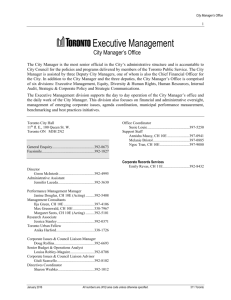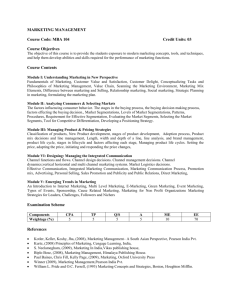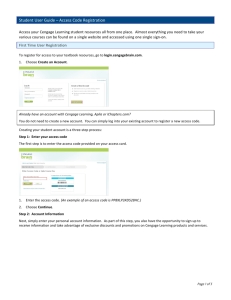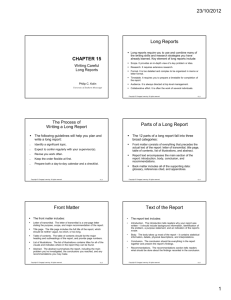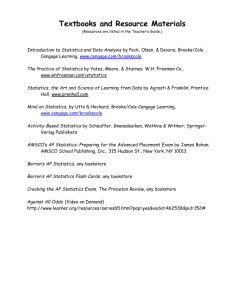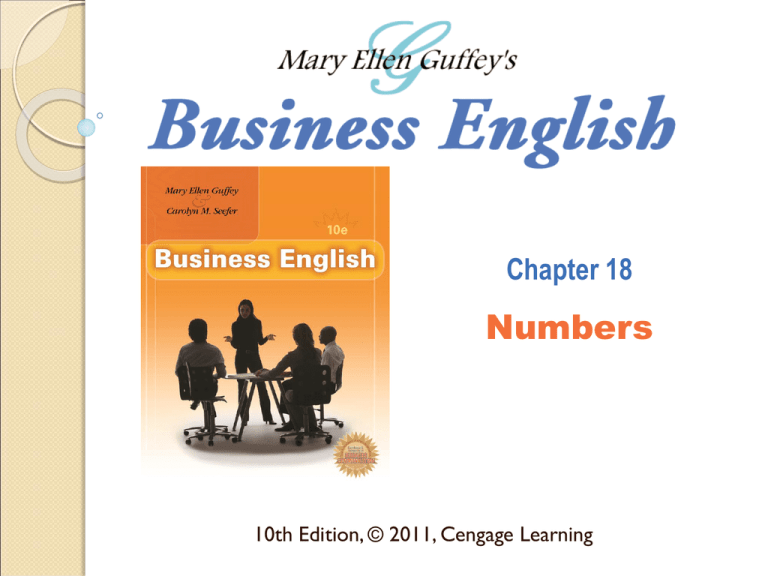
Chapter 18
Numbers
10th Edition, © 2011, Cengage Learning
General Rules
1.
The numbers one through ten are
generally written out as words.
The van held nine passengers in three seats.
2.
Numbers above ten are written as figures.
Professor Andrews had 47 students in two
classes.
Chapter 18, Guffey-Seefer, Business English, 10e, Copyright 2011 Cengage Learning, All Rights Reserved
18-2
General Rules
3.
Numbers that begin sentences are written
as words.
◦ If a number involves more than two words,
however, the sentence should be rewritten.
Thirty-eight states have ratified the
amendment.
A total of 116 delegates attended the opening
session. (NOT: One hundred sixteen
delegates . . . )
Chapter 18, Guffey-Seefer, Business English, 10e, Copyright 2011 Cengage Learning, All Rights Reserved
18-3
General Rules
4.
When expressing many numbers in figure
form, separate groups of three digits by
commas to improve clarity.
◦ Note: Does not apply to years, house
numbers, telephone/fax numbers, zip codes,
account numbers, or page numbers.
Joe Bowman’s starting salary in 2011 was
$49,000.
Chapter 18, Guffey-Seefer, Business English, 10e, Copyright 2011 Cengage Learning, All Rights Reserved
18-4
General Rules
5.
Compound numbers from 21 through 99
are hyphenated when they are written in
word form.
Fifty-seven people applied for the customer
service position with our firm.
Chapter 18, Guffey-Seefer, Business English, 10e, Copyright 2011 Cengage Learning, All Rights Reserved
18-5
Basic Guidelines for Expressing
Numbers
Money
Dates
Clock Time
Addresses
Telephone and Fax Numbers
Chapter 18, Guffey-Seefer, Business English, 10e, Copyright 2011 Cengage Learning, All Rights Reserved
18-6
Money—Dollars
Sums of money $1 or greater are
expressed as figures.
If a sum is a whole dollar amount, omit the
decimal and zeros (whether or not the
amount appears with fractional dollar
amounts).
Use currency ($) symbol.
Do not space between currency symbol
and number.
Do not include the word dollar.
Chapter 18, Guffey-Seefer, Business English, 10e, Copyright 2011 Cengage Learning, All Rights Reserved
18-7
Money—Dollars
Ms. White made purchases of $10,
$19.95, and $40.
Do you have $20 for the gift?
His new position pays $56,000 annually.
Chapter 18, Guffey-Seefer, Business English, 10e, Copyright 2011 Cengage Learning, All Rights Reserved
18-8
Money—Cents
Sums less than $1 are written as figures
followed by the word cents.
If they are part of sums greater than $1, use
a dollar sign and a decimal instead of the
word cents.
◦ Our stationery costs 4 cents a sheet.
◦ Petty cash purchases were $1.19, $.56, $1,
and $.92.
Chapter 18, Guffey-Seefer, Business English, 10e, Copyright 2011 Cengage Learning, All Rights Reserved
18-9
Dates
In dates, numbers that appear after the name of
the month are written in cardinal figures (1, 2, 3,
etc.).
Those that stand alone or appear before the
name of the month are written in ordinal figures
(1st, 2nd, 3rd, etc.).
Contracts must be signed and returned by
January 30.
On the 1st of January and again on the
15th, we sent reminders.
Chapter 18, Guffey-Seefer, Business English, 10e, Copyright 2011 Cengage Learning, All Rights Reserved
18-10
Clock Time
Figures are used when clock time is
expressed with a.m. or p.m. Either figures
or words may be used with the words
o’clock.
Appointments begin at 8:30 a.m. and end at
5 p.m.
I believe he called at three (or 3) o’clock.
Chapter 18, Guffey-Seefer, Business English, 10e, Copyright 2011 Cengage Learning, All Rights Reserved
18-11
Addresses—House Numbers
Except
for the number One, house
numbers are expressed as figures.
1672 Macomber Street
One Park Plaza
20 Elm Avenue
2111 Nevada Street
Chapter 18, Guffey-Seefer, Business English, 10e, Copyright 2011 Cengage Learning, All Rights Reserved
18-12
Addresses—Street Names
Street names that involve the number ten
or a lower number are written entirely as
ordinal words (First, Second,Third).
In street names involving numbers greater
than ten, the numeral portion is written in
figures.
114 Fifth Avenue
404 42nd Street
2094 East 33rd Street
11300 68th Avenue
Chapter 18, Guffey-Seefer, Business English, 10e, Copyright 2011 Cengage Learning, All Rights Reserved
18-13
Telephone and Fax Numbers
Telephone and fax numbers are expressed with
figures.
When used, generally place the area code in
parentheses preceding the telephone number.
You may also separate the area code from the
telephone number with a hyphen or with periods.
◦ Please call me at (925) 685-1230 if you have
comments.
◦ You can contact me at 404-394-1228, Ext. 295, after
10 a.m.
◦ Our toll-free number, 1.800.937-5594, is available 24
hours a day.
Chapter 18, Guffey-Seefer, Business English, 10e, Copyright 2011 Cengage Learning, All Rights Reserved
1814
Special Guidelines for Expressing
Numbers
Related Numbers
Consecutive Numbers
Periods of Time
Ages and Anniversaries
Round Numbers
Numbers Used With Words, Abbreviations,
and Symbols
Chapter 18, Guffey-Seefer, Business English, 10e, Copyright 2011 Cengage Learning, All Rights Reserved
18-15
Related Numbers
Related numbers should be expressed as the
largest number is expressed.
That department has two clerks, eight
administrative assistants, and one manager.
Of the 24 pieces of equipment, 2 copiers and
9 computers are still under warranty.
Two proposals covered 24 employees
working in three branch offices. (Not related)
Chapter 18, Guffey-Seefer, Business English, 10e, Copyright 2011 Cengage Learning, All Rights Reserved
18-16
Consecutive Numbers
When two numbers appear consecutively and they
both modify a following noun, generally express the
first number in words and the second in figures.
The builder has only four 3-bedroom homes left.
We received fifty 18-page promotional booklets.
If, however, the first number requires three or more
words, both numbers should be written as figures.
We need 155 44-cent stamps to complete the
mailing.
Chapter 18, Guffey-Seefer, Business English, 10e, Copyright 2011 Cengage Learning, All Rights Reserved
18-17
Periods of Time
Periods of time are expressed according to the
general rules (words for numbers ten and under;
figures for numbers 11 and greater).
The business has been operating for 23 years.
In the past five years, taxes have doubled.
Figures should be used to achieve special emphasis in
expressing business concepts such as discount rates,
interest rates, warranty periods, credit terms, and so forth.
• We gave that company a 2-month credit extension.
• The length of the loan was 60 days.
• The length of the warranty period is ninety (90) days.
(Both in contracts)
Chapter 18, Guffey-Seefer, Business English, 10e, Copyright 2011 Cengage Learning, All Rights Reserved
18-18
Ages and Anniversaries
Ages and anniversaries that can be expressed in
one or two words are generally written in word
form.
• At the age of thirty-four, Jeffrey Selnig was
named CEO.
• Reduced prices marked the firm’s twenty-fifth
anniversary.
Those that require more than two words are
written in figures.
• The company is 125 years old.
Chapter 18, Guffey-Seefer, Business English, 10e, Copyright 2011 Cengage Learning, All Rights Reserved
18-19
Ages and Anniversaries
Figures are also used when an age appears
immediately after a name; is expressed in exact
years and months, and sometimes days; or is
used in a legal or technical sense.
Lori Simmons, 26, was named manager two
years ago. (Appears immediately after a name)
A new contract was finally signed after 2
years and 10 months of negotiations.
(Expressed in exact years and months)
When he reaches 21, Thomas inherits a small
sum. (Used in a legal or technical sense)
Chapter 18, Guffey-Seefer, Business English, 10e, Copyright 2011 Cengage Learning, All Rights Reserved 18-20
Round Numbers
Round numbers (approximations) may be expressed
in word or figure form, although figure form is easier
to comprehend.
Nearly 100 (or one hundred) employees
invested in the company profit-sharing plan.
Round numbers in millions, billions, or trillions
should be expressed with a combination of figures
and words.
• About 2 million retail firms and 300,000
wholesale firms operate in the United States.
• That firm’s assets are valued at $3.4 billion.
Chapter 18, Guffey-Seefer, Business English, 10e, Copyright 2011 Cengage Learning, All Rights Reserved 18-21
Numbers Used With Words,
Abbreviations, and Symbols
Numbers used with words, abbreviations, and
symbols are expressed as figures.
Vehicle No. 23 is still being repaired.
Please view Table 3 on page 10.
You can reach her at Extension 435.
Chapter 18, Guffey-Seefer, Business English, 10e, Copyright 2011 Cengage Learning, All Rights Reserved 18-22
Additional Guidelines for
Expressing Numbers
Weights and Measurements
Fractions
Percentages
Decimals
Ordinals
Chapter 18, Guffey-Seefer, Business English, 10e, Copyright 2011 Cengage Learning, All Rights Reserved
18-23
Weights and Measurements
Express weights, measures, and temperatures as
figures.
• The Persian rug measured 9 x 12 feet.
• We needed 2 quarts of oil and 15
gallons of gasoline.
• The lowest temperature ever recorded was
minus 129 degrees Fahrenheit in 1983 at
a Russian station in Antarctica.
• Did you order the 16- or 20-pound
stationery?
Chapter 18, Guffey-Seefer, Business English, 10e, Copyright 2011 Cengage Learning, All Rights Reserved
18-24
Fractions
Simple fractions are expressed as words. If a fraction
functions as a noun, no hyphen is used. If it functions
as an adjective, a hyphen separates its parts.
Nearly two thirds of the members were present.
(Noun)
Getty purchased a four-fifths interest in Amco.
(Adjective)
Mixed fractions (whole numbers with fractions are
always expressed as figures.
His slides measured 2 ¼ by 2 ¼.
The recipe calls for 1 ¾ cups of flour.
Chapter 18, Guffey-Seefer, Business English, 10e, Copyright 2011 Cengage Learning, All Rights Reserved
18-25
Percentages
Percentages are expressed as figures that are
followed by the word percent.
The percent sign (%) is used only on business
forms or in statistical presentations.
Interest rates rose from 5 percent to 11
percent.
A total of 89 percent of the employees cast
votes in favor of the merger.
Chapter 18, Guffey-Seefer, Business English, 10e, Copyright 2011 Cengage Learning, All Rights Reserved
18-26
Decimals
Express with figures.
Specifications require a setting of .005 inch.
The elevator completed its descent in 8.7
seconds.
Fewer than 0.5 percent of the voters
supported the plan.
Chapter 18, Guffey-Seefer, Business English, 10e, Copyright 2011 Cengage Learning, All Rights Reserved
18-27
Ordinals
General rule: Ordinal numbers are expressed in
word form (first, second, third, etc.).
The first book was printed in the fifteenth
century.
Our bank ranks tenth in terms of total
assets.
Nancy Weagley represents the Thirty-first
Congressional District.
Chapter 18, Guffey-Seefer, Business English, 10e, Copyright 2011 Cengage Learning, All Rights Reserved
18-28
Ordinals
Three exceptions to the general rule should
be noted:
Figure form is used for dates appearing
before a month or appearing alone.
I called your office on the 5th and on
the 21st to confirm.
On the 9th of June, we signed the
contract.
Chapter 18, Guffey-Seefer, Business English, 10e, Copyright 2011 Cengage Learning, All Rights Reserved
18-29
Ordinals
Figure form is used for street names
involving numbers greater than ten.
◦ Their retail outlet is located on Eighth
Avenue; their warehouse is located on
42nd Street.
Figure form is used when the ordinal
would require more than two words.
◦ Special recognition was given to the
1,000th visitor.
Chapter 18, Guffey-Seefer, Business English, 10e, Copyright 2011 Cengage Learning, All Rights Reserved
18-30
Quick Chart for Number Expression
Use Words
Use Figures
Numbers ten and
Numbers 11 and over
under
Numbers at
beginnings of
sentences
Money
Dates
Addresses
Ages
Anniversaries
Simple fractions
Telephone/Fax Numbers
Weights/Measurements
Percentages/Decimals
Business terms
Chapter 18, Guffey-Seefer, Business English, 10e, Copyright 2011 Cengage Learning, All Rights Reserved
18-31

